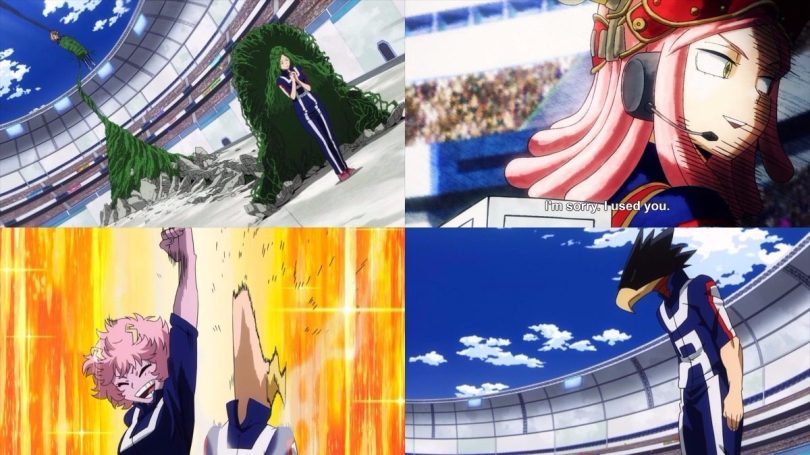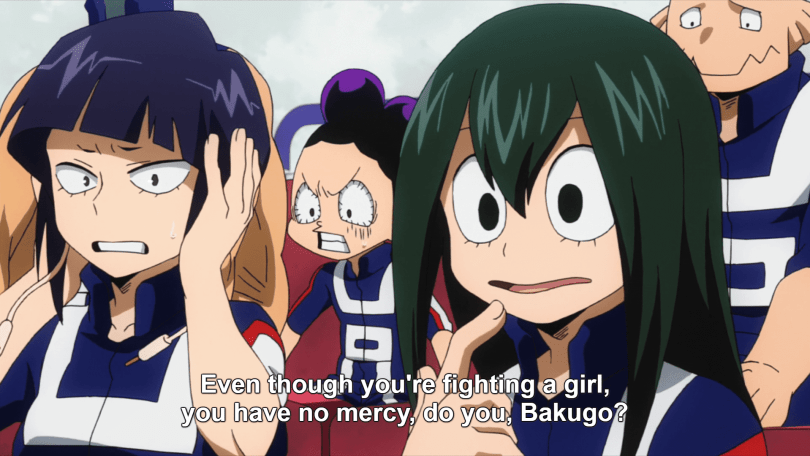SPOILERS: For the tournament arc of My Hero Academia, (up to episode 22).
The second season of Kohei Horikoshi’s My Hero Academia was one of the most hyped anime for the Spring 2017 season, no small accomplishment next to titles like Dragon Ball Super, Attack on Titan, and Boruto. Horikoshi has built a story that is now considered an inheritor in the pantheon of Weekly shounen Jump blockbusters now that Bleach and Naruto have both reached their conclusions.
The success of My Hero Academia can be attributed to many factors, but most prominent among them, at least to me, has been Horikoshi’s immense familiarity with both western superheroes and mainstream shounen genres, utilizing the strengths of both while showing a willingness to break from tradition to create a truly unique story. One such example is in his handling of female characters in that shounen staple: the tournament arc.
The progress for women in shounen has been slow, but it’s there. Since the days of Dragon Ball Z, women have become progressively more prominent characters in male-dominated casts, taking on more dedicated fighting roles among the primary characters, but series consistently fall short when it matters most. Women are inevitably matched up against one another in tournament arcs, take on healing, utility, and room clearing roles while the men take on the major villains.
In a way, it can be even more frustrating to see a growing number of great female characters relegated to secondary roles within the narrative. Horikoshi seems well aware of this dynamic and confronts it directly through the sexist perceptions of the characters in the story, most prominently in the second season’s tournament fight between gravity-controlling Ochaco Uraraka and the explosive Katsuki Bakugo.

The matches leading into the fight set a foundation for our expectations. We’re presented with four fights featuring male characters versus female characters. Kaminari and Aoyama each approach their bouts certain of their own victory, promising to swiftly end the fight only to be summarily crushed, in Ashido’s case notably due to her physical superiority. Despite being provided with an advantage in his fight, Iida is little more than a set piece for Hatsume’s tech demo before she drops out of the tournament.
Only Tokoyami emerges truly victorious from the boys’ camp, driving Yaoyorozu out of bounds before she can make use of her creation quirk. The final result is 2-2 (really 3-1) and we are shown the girls are just as capable as the boys, with the boys who failed to respect their opponent suffering humiliating defeats despite their powerful quirks.

My Hero Academia takes place in a world where physical capability is only one tool in a kit that fighters have available to them. Size and strength can be useless against opponents who use mental powers or are composed of intangible shadow. Any physical advantage a male character might have in a fight is reduced to insignificance.
Yet, moving into his match against Ochaco, Bakugo is labelled a villain before he even steps into the ring because his opponent is female. Women are implicitly considered beings too fragile to handle roughly, so Bakugo’s willingness to use his violent quirk on a girl can only mean he is cruel. More than appreciating that the odds are against Ochaco given their respective capabilities, the fight itself is treated as a farce.

Ochaco rejects Deku’s offer for aid in recognition that they are all rivals and must rise based on their own merits, even though Deku himself received coaching from Ojiro before his fight with Shinso. We quickly learn that she didn’t even need the help.
Her plan at first is identical to the advice Deku would have given her, but no one knows her quirk better than her. Where Deku’s plan stopped at trying to avoid Bakugo’s blast and close in to touch him, Ochaco had thought several steps further by using Bakugo’s own quirk against him, taking advantage of the smoke and rubble of his explosions to set up her decisive move. Not even Ochaco realizes just how close she came to victory.

Bakugo appears to acknowledge Ochaco as a real threat, using his quirk to blast her away and work her down slowly, fighting her at range despite his specialization in hand-to-hand combat. After several minutes, the crowd begins to boo him.
His slow strategy is perceived as nothing more than bullying. A professional hero demands Bakugo end the fight. Even their classmate Tsuyu, who is normally quick to call out chauvinistic comments, thinks Bakugo is merely toying with Ochaco.

Eventually, their teacher Aizawa-sensei shouts them down on the loudspeaker, calling out the audience’s sexist perception that Bakugo is picking on a frail girl rather than participating in a match between peers.


But even Aizawa wasn’t entirely correct. Bakugo had been fighting so cautiously not out of respect for Ochaco, but because he was sure that Deku had provided her with a scheme to defeat him.


After losing to Deku’s strategy during their mock trials, he was playing it safe until Ochaco was forced to play her hand. Even expecting a sudden turn, he is only just barely able to escape her trap. Believing Deku’s plan foiled, he begins to close the distance between them, unafraid of Ochaco on her own. It’s only after the match that he learns Ochaco had refused Deku’s help and he must confront the fact that he had very nearly been beaten by her alone.


In the aftermath, it seems the match, even with Aizawa-sensei’s interjection, has done little to affect anyone’s perceptions. Bakugo returns to his classmates and is greeted by further criticism and labeled a villain for doing what was absolutely necessary to win.
Even when faced with their own misogynistic thinking, the majority were unable to change their way of thinking. There is something terribly believable about this unfortunate outcome. But, just as the fight was a showcase of Ochaco’s determination and unrealized potential, it may also represent a crucial step in Bakugo’s growth as a character.

My Hero Academia isn’t perfect. It has its problematic moments and it would have been wonderful if one piece of the primary triadic rivalry could be female. It remains to be seen whether the female members of class 1-A will be able to remain relevant as the stakes are raised or whether they will fall to the wayside as they do in so many other shounen, and as they sadly did in this very tournament, serving predominantly as a means to progress the male characters’ arcs.
However, this event shows a very real awareness by the author of the traditional roles female characters are relegated to in the genre, which gives me hope that this series may allow its female cast to break free of these archetypes.






Comments are open! Please read our comments policy before joining the conversation and contact us if you have any problems.